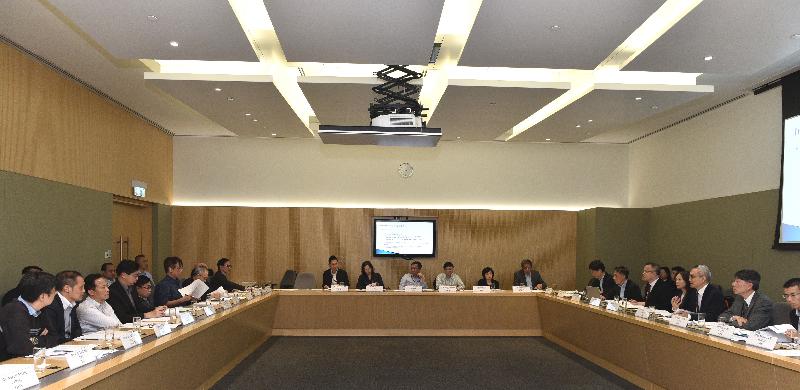Following the meeting in January this year, the inter-departmental Pest Control Steering Committee today (March 26) met again to review mosquito control work carried out by various government departments ahead of the rainy season, to map out publicity strategies, enhance public awareness of mosquito prevention and control, and explore ways to strengthen mosquito control measures.
The Under Secretary for Food and Health, Dr Chui Tak-yi, said, "The targets of the Steering Committee this year are to enhance prevention, co-ordination and surveillance work of the departments. Regarding preventive work, various departments will conduct fogging operations before the onset of the rainy season and commence the territory-wide All-out Anti-mosquito Operations together in early April."
The major anti-mosquito measures of the All-out Anti-mosquito Operations include:
* carrying out fogging in the scrubby areas within a 100-metre radius around residences to kill adult mosquitoes weekly;
* carrying out inspection, removing stagnant water, applying insecticide and disposing of abandoned water containers weekly to prevent mosquito breeding; and
* trimming of grass to discourage resting of the adult mosquitoes on the site.
Various departments have outlined a list of locations required for fogging operations and will start the operations simultaneously at the beginning of the rainy season. Fogging operations will be conducted regularly to kill adult mosquitoes until the end of the rainy season.
Dr Chui said, "The rainy season is conducive to mosquito proliferation and breeding. The threats posed to public health by mosquito-borne diseases should not be underestimated. The Government has been all along strengthening its mosquito prevention and control measures and the co-operation and support from the public is vital. Members of the public should pay attention to the environmental hygiene of their households and surroundings in order to prevent mosquito breeding."
To promote the participation of the community, the Secretary for Food and Health had issued letters to the District Councils, urging the public to carry out mosquito prevention and control work, to clear areas that may have stagnant water within private premises, and to report potential breeding grounds to the respective District Environmental Hygiene Office for follow-up actions. In addition, the Food and Environmental Hygiene Department (FEHD) had sent letters to property management company associations in Hong Kong, urging property management companies to conduct mosquito prevention and control work properly. Different government departments will also proactively disseminate anti-mosquito messages in the coming months and promote territory-wide participation in mosquito prevention and control.
Various departments have already been allocated additional resources to enhance pest control work under the co-ordination of the Steering Committee. During today's meeting, the departments reported to the Steering Committee on the mosquito prevention work being carried out in the areas under their purview. This included clearing stagnant water, fallen leaves and accumulated refuse with a view to reducing rapid mosquito breeding owing to water accumulation during the rainy season.
Moreover, to better monitor the contractors' performance and effectiveness in pest control work, government departments will gradually include standard pest control terms when entering into new cleaning service contracts. The departments have already set timetables for including the relevant terms in all cleaning service contracts.
To strengthen the prevention of mosquito borne diseases from entering Hong Kong through various ports and control points, the Steering Committee provided departments responsible for managing ports and control points with relevant advice, including designating staff responsible for anti-mosquito work, carrying out detailed surveying on mosquito problems at various ports and control points, and keeping records on mosquito control and prevention work. In addition, the Steering Committee also suggested installing mosquito trapping devices to kill adult mosquitos at suitable locations. The FEHD will continue carry out weekly surveillance on dengue fever vectors at ports and control points, and conduct dengue virus tests on collected samples of Aedes albopictus.
Sustained efforts and co-operation among various sectors of the community and the Government are essential for effective mosquito control. As Aedes albopictus breeds in small water bodies, members of the public should carry out effective mosquito prevention and control measures, including inspecting their homes and surroundings to remove potential mosquito breeding grounds, changing water in vases and removing the water in saucers under potted plants at least once a week, properly disposing containers such as soft drink cans and lunch boxes, and drilling large holes in unused tyres.
Members of the public and property management companies should keep drains free of blockage and level all defective ground surfaces to prevent water accumulation. They should also scrub all drains and surface sewers with alkaline detergent at least once a week to remove any mosquito eggs. Environmental hygiene of the sites should be maintained if maintenance works are being carried out to prevent water accumulation that may lead mosquito problems.
Representatives from three bureaux and 23 departments/organisations attended today's meeting.
Follow this news feed: East Asia







